A free online resource, launched today, will help conservation organizations share expertise and tools, aiding them in addressing some of the planet's most challenging conservation issues.
Oct 1st, 2014
Read more
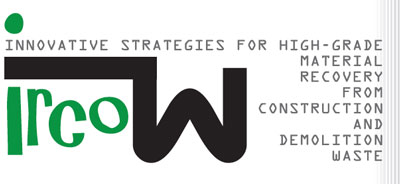 Some 380 million tonnes of construction and demolition waste are generated every year and most of it ends up in landfills. Re-using and recycling components and materials is good for the environment and saves money, but industry has been less than enthusiastic. An EU-funded research project has laid the foundations for change - it is promoting concrete, ceramics, gypsum and plastics recycling around Europe.
Some 380 million tonnes of construction and demolition waste are generated every year and most of it ends up in landfills. Re-using and recycling components and materials is good for the environment and saves money, but industry has been less than enthusiastic. An EU-funded research project has laid the foundations for change - it is promoting concrete, ceramics, gypsum and plastics recycling around Europe.
Oct 1st, 2014
Read more
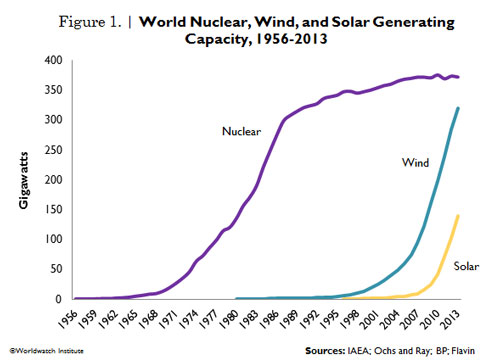 New Worldwatch Institute analysis examines global trends in renewable and nuclear power.
New Worldwatch Institute analysis examines global trends in renewable and nuclear power.
Sep 30th, 2014
Read more
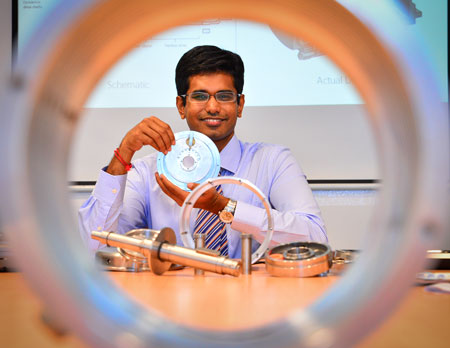 This innovative engine integrates the traditional electric motor with the air-con compressor, typically two separate units. This novel, space-saving design allows the use of bigger batteries, which can increase the range of electric vehicles by an additional 15 to 20 per cent.
This innovative engine integrates the traditional electric motor with the air-con compressor, typically two separate units. This novel, space-saving design allows the use of bigger batteries, which can increase the range of electric vehicles by an additional 15 to 20 per cent.
Sep 30th, 2014
Read more
 Present-day lithium batteries are efficient but involve a range of resource and environmental problems. Using materials from alfalfa (lucerne seed) and pine resin and a clever recycling strategy, researchers have now come up with a highly interesting alternative.
Present-day lithium batteries are efficient but involve a range of resource and environmental problems. Using materials from alfalfa (lucerne seed) and pine resin and a clever recycling strategy, researchers have now come up with a highly interesting alternative.
Sep 29th, 2014
Read more
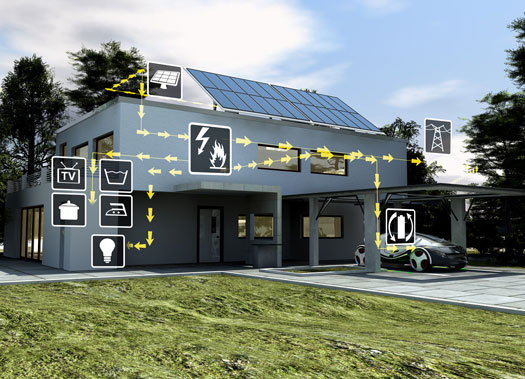 The 'Internet of Energy' is defined as the networking of relatively autonomous electricity producers and consumers, who determine and cover the energy demand among themselves. Such an infrastructure will become necessary when large numbers of electric vehicles have to be supplied with energy in the future.
The 'Internet of Energy' is defined as the networking of relatively autonomous electricity producers and consumers, who determine and cover the energy demand among themselves. Such an infrastructure will become necessary when large numbers of electric vehicles have to be supplied with energy in the future.
Sep 26th, 2014
Read more
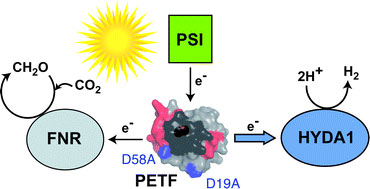 Modified enzymes enable efficient hydrogen production.
Modified enzymes enable efficient hydrogen production.
Sep 25th, 2014
Read more
Governor Andrew M. Cuomo today announced a new, one million-square-foot site for the future SolarCity GigaFactory facility, which will manufacture solar panels at the RiverBend site in South Buffalo.
Sep 23rd, 2014
Read more
 Insulation for homes of the future may be harvested from fields of kenaf, an alternative to fiberglass.
Insulation for homes of the future may be harvested from fields of kenaf, an alternative to fiberglass.
Sep 23rd, 2014
Read more
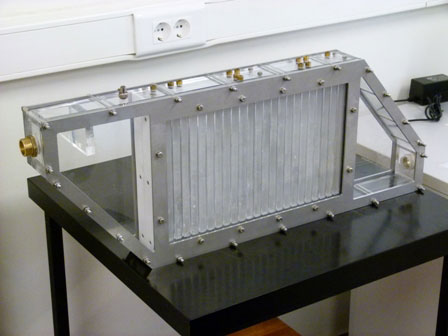 Researchers have developed a modular device based on paraffins that allows thermal energy to be stored, thus reducing the total volume of the system by 50 percent with respect to storage by means of water, traditionally used in buildings.
Researchers have developed a modular device based on paraffins that allows thermal energy to be stored, thus reducing the total volume of the system by 50 percent with respect to storage by means of water, traditionally used in buildings.
Sep 23rd, 2014
Read more
Scientists have scoured cow rumens and termite guts for microbes that can efficiently break down plant cell walls for the production of next-generation biofuels, but some of the best microbial candidates actually may reside in the human lower intestine, researchers report.
Sep 23rd, 2014
Read more
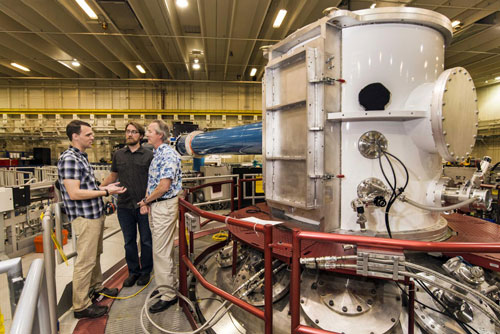 Researchers at Sandia National Laboratories' Z machine have produced a significant output of fusion neutrons, using a method fully functioning for only little more than a year.
Researchers at Sandia National Laboratories' Z machine have produced a significant output of fusion neutrons, using a method fully functioning for only little more than a year.
Sep 23rd, 2014
Read more
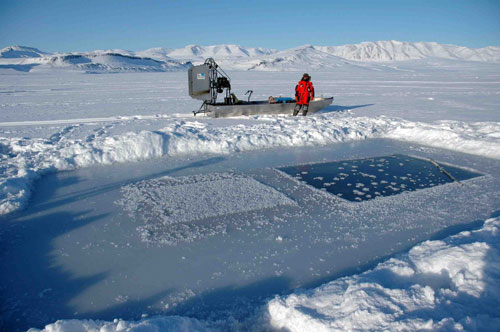 Climate change is a fact, and most of the warming is caused by human activity. The Arctic is now so warm that the extent of sea ice has decreased by about 30 percent in summer and in winter, sea ice is getting thinner. New research has shown that sea ice removes CO2 from the atmosphere. If Arctic sea ice is reduced, we may therefore be facing an increase of atmospheric concentration of CO2, researchers warn.
Climate change is a fact, and most of the warming is caused by human activity. The Arctic is now so warm that the extent of sea ice has decreased by about 30 percent in summer and in winter, sea ice is getting thinner. New research has shown that sea ice removes CO2 from the atmosphere. If Arctic sea ice is reduced, we may therefore be facing an increase of atmospheric concentration of CO2, researchers warn.
Sep 22nd, 2014
Read more
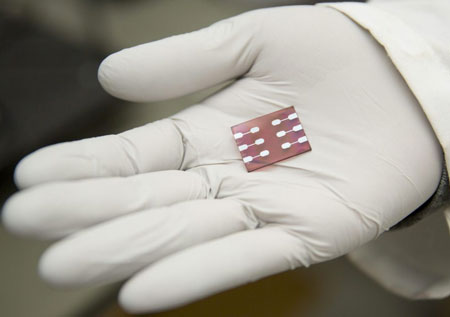 Researchers identified a new polymer that improved the efficiency of solar cells. They also determined the method by which the polymer improved the cells' efficiency. The polymer allows electrical charges to move more easily throughout the cell, boosting the production of electricity - a mechanism never before demonstrated in such devices.
Researchers identified a new polymer that improved the efficiency of solar cells. They also determined the method by which the polymer improved the cells' efficiency. The polymer allows electrical charges to move more easily throughout the cell, boosting the production of electricity - a mechanism never before demonstrated in such devices.
Sep 22nd, 2014
Read more
ARPA-E has awarded $2,540,000 to develop dual-junction solar cells that can operate efficiently at extreme temperatures above 750 degrees Fahrenheit. In addition to converting a portion of the sunlight directly into electricity, the solar cells will use the remainder of the light to heat high-temperature fluids that can drive a steam turbine or be stored for later use.
Sep 22nd, 2014
Read more
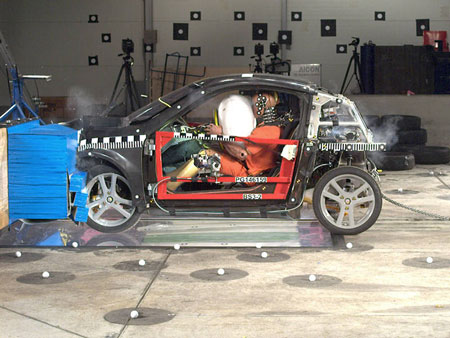 Traffic experts warn that the current safety standards of the L7E vehicle class ('quad class') are not sufficient for wide-scale deployment in traffic. Researchers of the Visio.M consortium's Safety subproject have accepted this challenge and are now demonstrating how even light and efficient electric vehicles can achieve an acceptable level of safety.
Traffic experts warn that the current safety standards of the L7E vehicle class ('quad class') are not sufficient for wide-scale deployment in traffic. Researchers of the Visio.M consortium's Safety subproject have accepted this challenge and are now demonstrating how even light and efficient electric vehicles can achieve an acceptable level of safety.
Sep 22nd, 2014
Read more
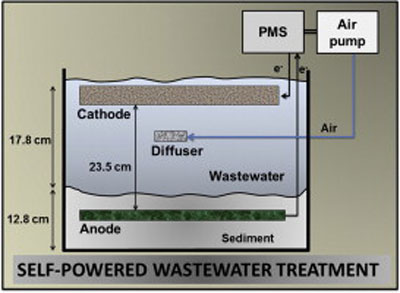 Researchers have developed a unique method to use microbes buried in pond sediment to power waste cleanup in rural areas. The first microbe-powered, self-sustaining wastewater treatment system could lead to an inexpensive and quick way to clean up waste from large farming operations and rural sewage treatment plants while reducing pollution.
Researchers have developed a unique method to use microbes buried in pond sediment to power waste cleanup in rural areas. The first microbe-powered, self-sustaining wastewater treatment system could lead to an inexpensive and quick way to clean up waste from large farming operations and rural sewage treatment plants while reducing pollution.
Sep 19th, 2014
Read more
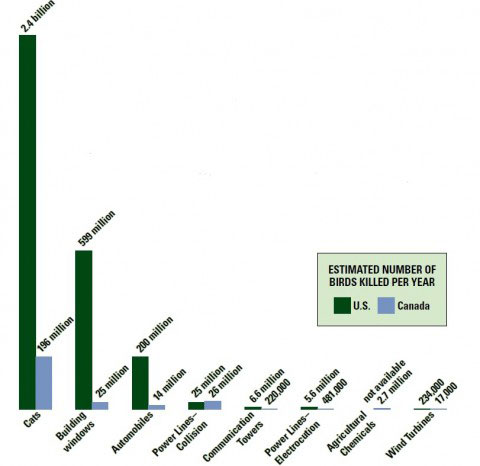 A comprehensive peer-reviewed study released today provides the most detailed analysis to date of the impact of bird fatalities at wind energy facilities in North America, and is the first to measure the relative impact of those fatalities on populations of small passerines, including songbirds.
A comprehensive peer-reviewed study released today provides the most detailed analysis to date of the impact of bird fatalities at wind energy facilities in North America, and is the first to measure the relative impact of those fatalities on populations of small passerines, including songbirds.
Sep 18th, 2014
Read more

 Subscribe to our Cleantech News feed
Subscribe to our Cleantech News feed












